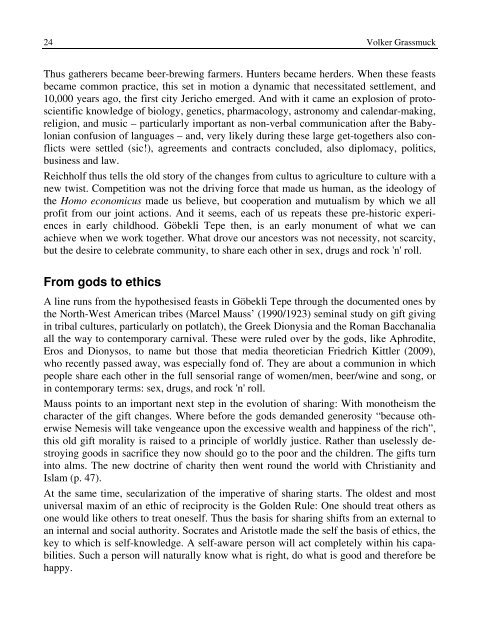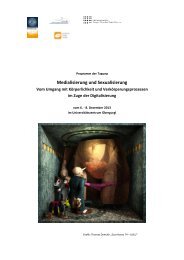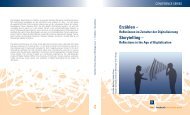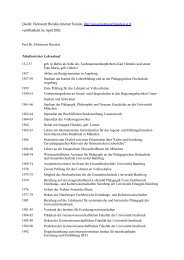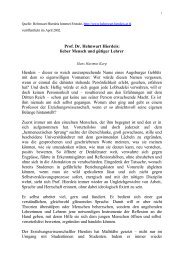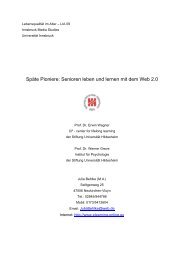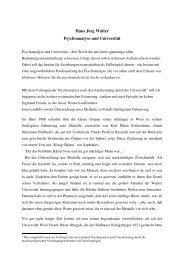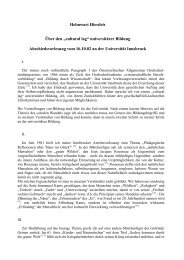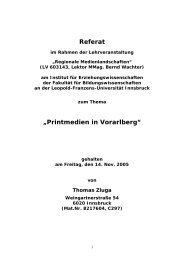Download pdf - Universität Innsbruck
Download pdf - Universität Innsbruck
Download pdf - Universität Innsbruck
Erfolgreiche ePaper selbst erstellen
Machen Sie aus Ihren PDF Publikationen ein blätterbares Flipbook mit unserer einzigartigen Google optimierten e-Paper Software.
24 Volker Grassmuck<br />
Thus gatherers became beer-brewing farmers. Hunters became herders. When these feasts<br />
became common practice, this set in motion a dynamic that necessitated settlement, and<br />
10,000 years ago, the first city Jericho emerged. And with it came an explosion of protoscientific<br />
knowledge of biology, genetics, pharmacology, astronomy and calendar-making,<br />
religion, and music – particularly important as non-verbal communication after the Babylonian<br />
confusion of languages – and, very likely during these large get-togethers also conflicts<br />
were settled (sic!), agreements and contracts concluded, also diplomacy, politics,<br />
business and law.<br />
Reichholf thus tells the old story of the changes from cultus to agriculture to culture with a<br />
new twist. Competition was not the driving force that made us human, as the ideology of<br />
the Homo economicus made us believe, but cooperation and mutualism by which we all<br />
profit from our joint actions. And it seems, each of us repeats these pre-historic experiences<br />
in early childhood. Göbekli Tepe then, is an early monument of what we can<br />
achieve when we work together. What drove our ancestors was not necessity, not scarcity,<br />
but the desire to celebrate community, to share each other in sex, drugs and rock 'n' roll.<br />
From gods to ethics<br />
A line runs from the hypothesised feasts in Göbekli Tepe through the documented ones by<br />
the North-West American tribes (Marcel Mauss’ (1990/1923) seminal study on gift giving<br />
in tribal cultures, particularly on potlatch), the Greek Dionysia and the Roman Bacchanalia<br />
all the way to contemporary carnival. These were ruled over by the gods, like Aphrodite,<br />
Eros and Dionysos, to name but those that media theoretician Friedrich Kittler (2009),<br />
who recently passed away, was especially fond of. They are about a communion in which<br />
people share each other in the full sensorial range of women/men, beer/wine and song, or<br />
in contemporary terms: sex, drugs, and rock 'n' roll.<br />
Mauss points to an important next step in the evolution of sharing: With monotheism the<br />
character of the gift changes. Where before the gods demanded generosity “because otherwise<br />
Nemesis will take vengeance upon the excessive wealth and happiness of the rich”,<br />
this old gift morality is raised to a principle of worldly justice. Rather than uselessly destroying<br />
goods in sacrifice they now should go to the poor and the children. The gifts turn<br />
into alms. The new doctrine of charity then went round the world with Christianity and<br />
Islam (p. 47).<br />
At the same time, secularization of the imperative of sharing starts. The oldest and most<br />
universal maxim of an ethic of reciprocity is the Golden Rule: One should treat others as<br />
one would like others to treat oneself. Thus the basis for sharing shifts from an external to<br />
an internal and social authority. Socrates and Aristotle made the self the basis of ethics, the<br />
key to which is self-knowledge. A self-aware person will act completely within his capabilities.<br />
Such a person will naturally know what is right, do what is good and therefore be<br />
happy.


